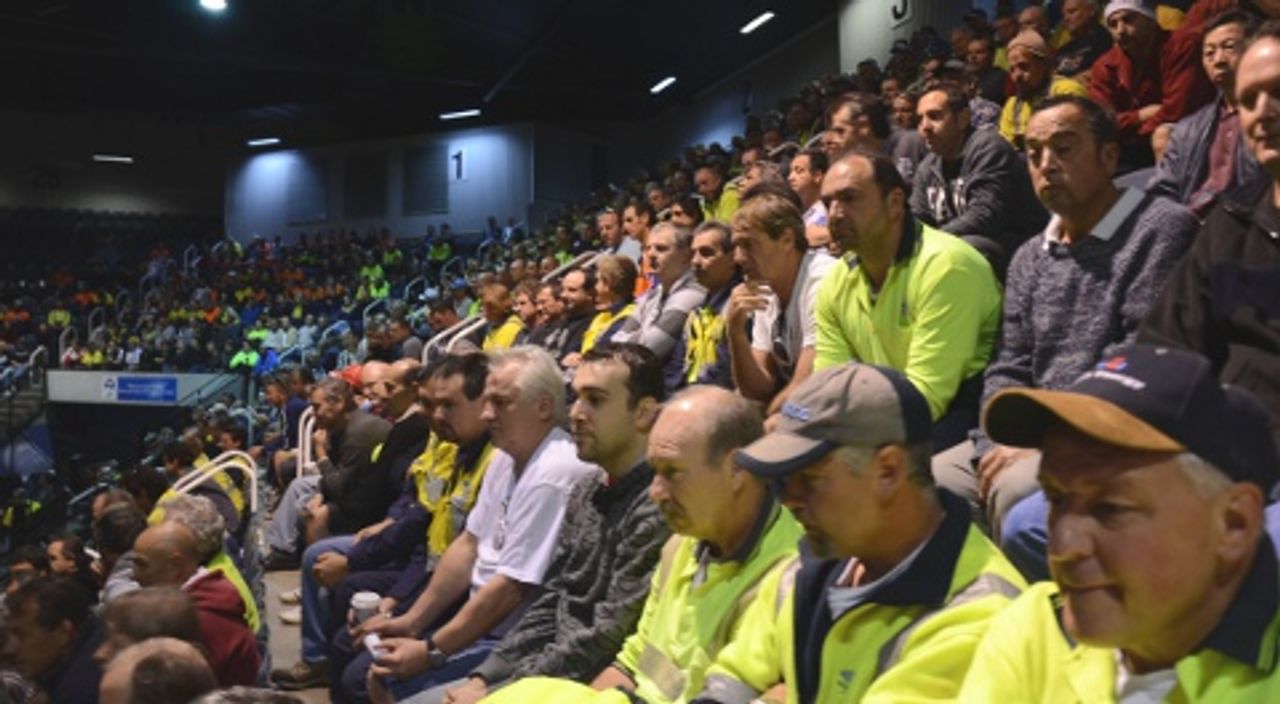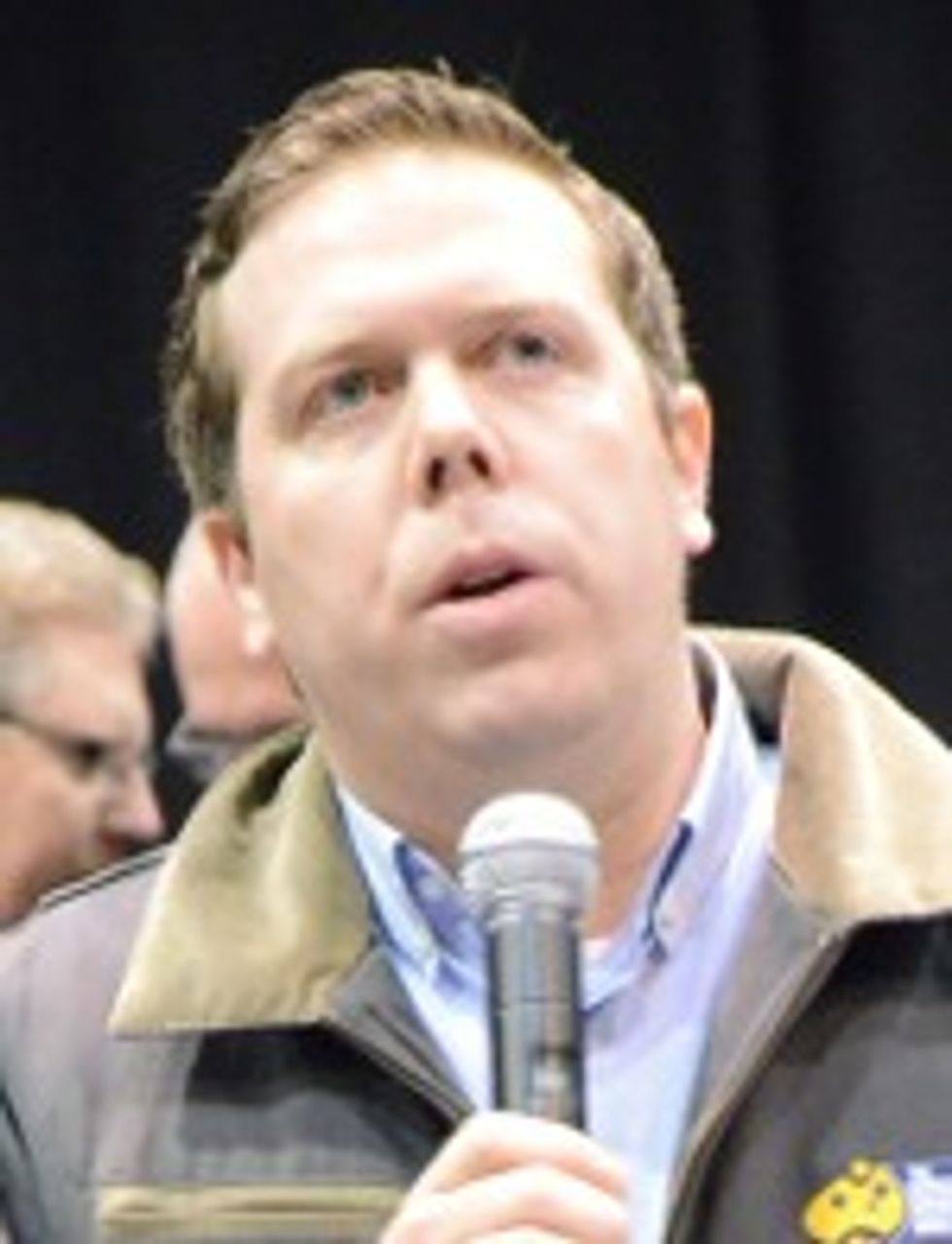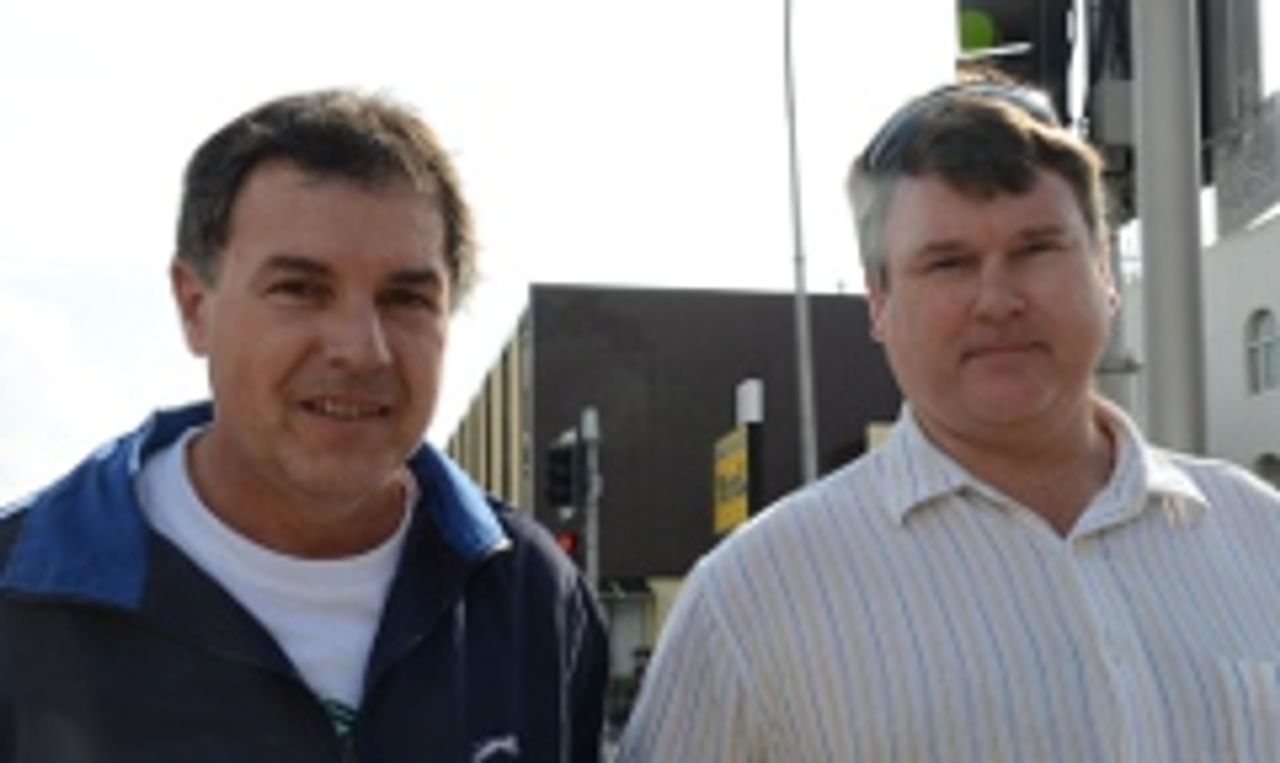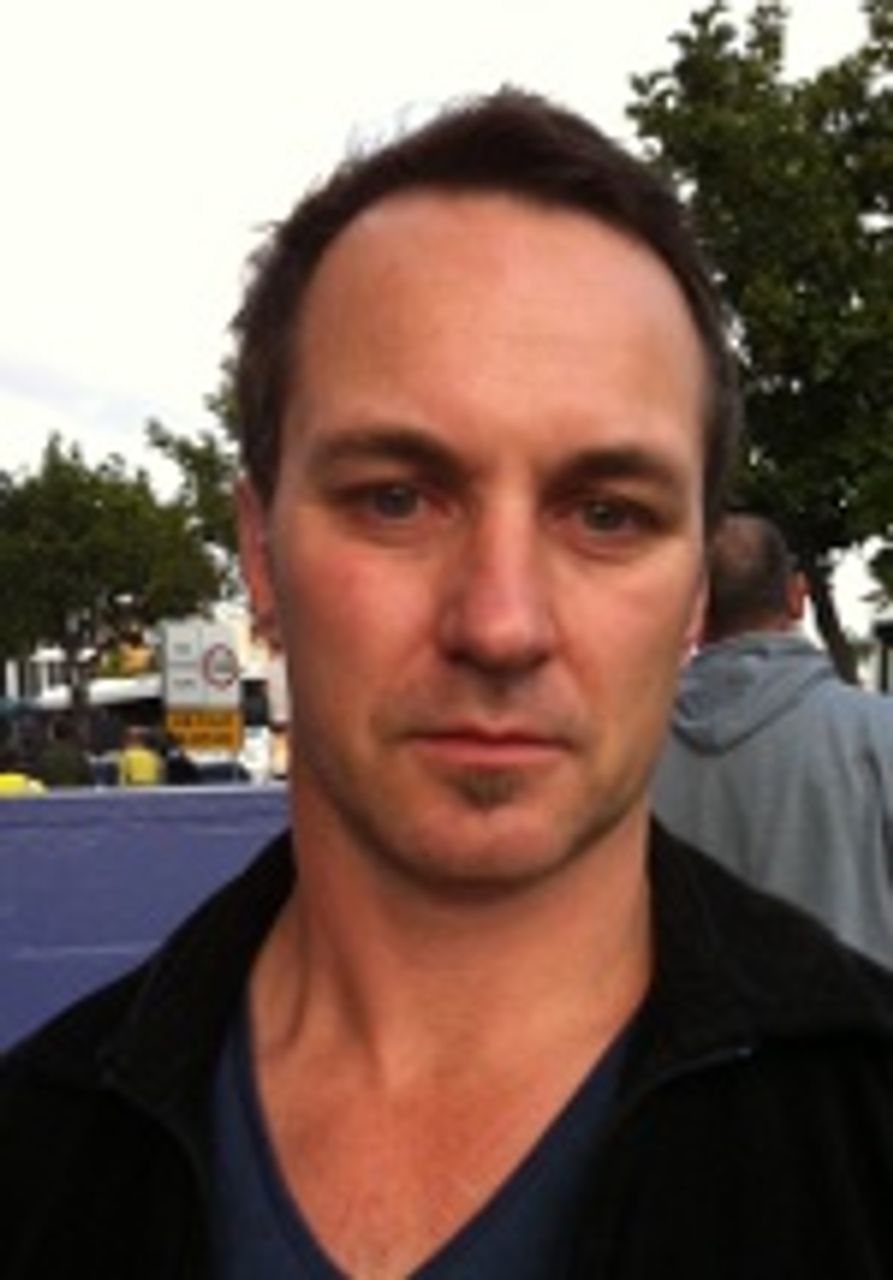The role of the trade unions in imposing BlueScope Steel’s axing 1,400 jobs was on display yesterday at a mass meeting of about 1,600 Port Kembla workers at the Wollongong Entertainment Centre on the New South Wales south coast. It was the first mass meeting of Port Kembla steel workers since 2004. The company plans to eliminate 1,100 jobs from its Port Kembla steel plant and 300 at its Hastings rolling mill in Victoria.
Union officials told the meeting that they were “shocked” and “surprised” when the company announced its job destruction plans on August 22. These claims are entirely bogus. Not only did they know of the company’s plans in advance, but they are part of an orchestrated campaign involving the Labor government and the company to carry out BlueScope’s dictates.
 A section of the meeting
A section of the meetingFollowing the BlueScope announcement, the Labor government pledged additional funds for retrenchment packages, while the unions rushed into meetings with government officials. This week Australian Workers Union national secretary Paul Howes, Australian Manufacturing Workers Union head Dave Oliver, and Australian Industry Group chief Heather Ridout held a meeting with Prime Minister Gillard and Industry Minister Kim Carr in Canberra to discuss a joint approach to the crisis in manufacturing.
What the unions are proposing is a deepening of the corporatist collaboration with government and the companies that under previous Hawke and Keating Labor governments decimated the manufacturing industry. Thousands of jobs were destroyed in Port Kembla under the Steel Plan in the 1980s.
Just as they have done during the past 30 years, steel union officials are working to block any struggle to defend jobs by persuading workers to take “voluntary” retrenchment packages and ensure an “orderly downsize” of BlueScope’s operations.
The union’s official resolution yesterday—which was not distributed to workers at the mass meeting, but read out and passed without discussion—called for no forced redundancies and an increased retrenchment package. It then appealed to the company to negotiate the next round of restructuring with the unions to make BlueScope more “internationally competitive”.
The number of jobs at the Port Kembla steelworks has already plunged from about 25,000 in the early 1980s to just over 3,000 now. Productivity has been driven up from approximately 190 tonnes of steel produced per employee per year, to almost 1,750 tonnes per employee per year. A new drive to boost productivity will not guarantee jobs or even ensure that the Port Kembla plant will remain open—as evidenced by the closure of the Newcastle steelworks in 1999.
The only issues raised by the unions at the Port Kembla mass meeting were a better retrenchment package—the unions want 4 weeks pay for every year of service, 14 weeks’ notice, and a $5,000 cash payment—and when “expressions of interest” for redundancies are to be lodged.
By pressuring workers to trade off their jobs for a redundancy package, the unions are selling off the future of the working class, particularly of the next generation. Youth unemployment in parts of Port Kembla and surrounding suburbs is already 30 percent and amongst the highest in New South Wales.
In the mass meeting, union officials engaged in some anti-corporate demagogy, including denunciations of BlueScope management for awarding themselves $3 million in bonuses. But these well-paid union officials hobnob with government and business representatives on a daily basis. The unions themselves are run as business enterprises that provide services to the corporate elite in suppressing the opposition of workers to never-ending restructuring.
 Paul Howes
Paul HowesAustralian Workers Union (AWU) national secretary Paul Howes again promoted anti-China chauvinism and “buy Australia” protectionism. “We don’t want to become a big sand pit for China and a tourist resort for North Asia,” he declared. “We have to put pressure on BHP and the Australian government to demand Australian companies use local steel.” All of this is to try and obscure the role of the trade unions pushing through the job cuts.
AWU Port Kembla branch secretary Andy Gillespie told the Illawarra Mercury prior to the meeting that it was necessary to be “realistic” about BlueScope’s cuts. He told workers at the mass meeting to immediately apply for voluntary retrenchment: “We’ll sit down after the expressions of interests have come in and see if we can mix and match ... I think we can achieve the numbers wanted ... We have begun this dialogue [with BlueScope] and it would be cruel if we delayed this process unnecessarily.”
Gillespie called on BlueScope management to collaborate with the unions in the next round of restructuring. “We told them [BlueScope] that if you want to restructure jobs in other areas then you have to do it when the agreement expires in March,” he declared. “You’ve got to come to us and we’ll talk to you about it then.”
The mass meeting in Port Kembla is another warning to workers that it is impossible to defend the basic right to a job through the trade unions. The interests of these organisations—which function as the industrial police force of the profit system—and those of the working class are entirely incompatible.
BlueScope workers face an historic choice. To defend their jobs and other basic rights involves a complete break with the trade unions, the formation of rank-and-file committees and the development of an independent political struggle of the working class against BlueScope Steel and the Labor government. That fight can only go forward on the basis of a socialist and internationalist program. We urge BlueScope workers as well as other sections of the working class and youth to study the SEP’s statement and to attend our public meetings in Port Kembla and Hastings.
* * *
While the official union resolution was passed at yesterday’s mass meeting, many BlueScope workers told World Socialist Web Site reporters that all jobs should be defended.
 Michael Boswick (left) and Steve Lambert
Michael Boswick (left) and Steve LambertElectrician Michael Boswick said: “They can put all the redundancy money in front of me that they like, but I definitely want my job. I’ve got three children, a wife and a mortgage still. If I get a VR [voluntary redundancy] it will go on the mortgage, but what happens after that? How are you supposed to live?
“The company is saying, ‘go to the mines,’ but is that really the answer? This is bad for young people, this means they’ve got no future. I’m scared that if these job cuts happen, it might only be the start and the workforce will be further reduced. And what happens after that? It will be like in Newcastle. They will run it to the ground, and nobody will have a job here.”
Steve Lambert, who works in instrumentation, said: “I’ve got three kids and a wife and a family and most people here are in the same boat. They’ve all got families and have always lived in the area. It’s a huge impact; it’s pretty devastating for everyone. I hope this isn’t the first stage of something bigger down the track and that there’s a future here for BlueScope.”
 Colin Dean
Colin DeanColin Dean said: “It is appalling that the company is shutting the blast furnace No. 6 and reducing production. We should be demanding that there be no loss of jobs and they don’t shut the blast furnaces.
“I really don’t know why the union goes along with the redundancy negotiations, maybe it’s because management won’t listen. We need to do something but I don’t exactly know what. The union is supposed to be our voice.”
 Jon-Paul Bassett
Jon-Paul BassettJon-Paul Bassett said: “I’m a contractor with QCM, which is a small locally-owned company, and my job is gone. BlueScope have told us they will use our products but in a much diminished capacity. There are three of us and a manager, and so the manager will probably run the company one day a week.
“I’ve just bought a unit in North Wollongong and will have to service the mortgage on that every two weeks, and there’s another guy who has just built a house. There’s talk about people getting other jobs, but in this depressed economy there’s nothing in Wollongong. Maybe I can get a fly in fly out job in the mines, but what are young people going to do? It’s not good and if Labor’s carbon tax comes in it will be even worse.”
Subscribe to the IWA-RFC Newsletter
Get email updates on workers’ struggles and a global perspective from the International Workers Alliance of Rank-and-File Committees.
